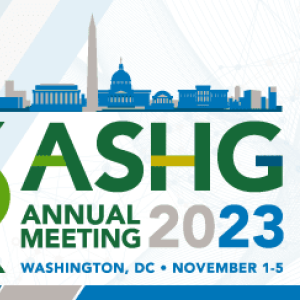Event Date:
October 31st 8:00 AM - November 5th 1:00 PM

The American Society of Human Genetics annual meeting is one of the largest conferences for human genetics and genomics research. This year’s meeting in Washington, DC is also a celebration of the society's 75th Anniversary. Our faculty and their graduate students and post-doctoral fellows will be presenting cutting-edge research.
From the Bush lab:
- Electronic phenotyping in the UK Biobank using the OMOP Common Data Model, to be presented by Biomedical Health Informatics (BHI) graduate student Diya Yang
- Elucidating ancestral differences in expression quantitative trait loci architecture relative to Alzheimer’s Disease Status, to be presented by Systems Biology and Bioinformatics (SYBB) graduate student Makaela Mews
- Haptoglobin genotype calling and allele specific expression in AD, to be presented by post-doctoral fellow Dr. Esteban Vazquez-Hidalgo
- Increasing the Power of the Sequence Kernel Association Tests (SKAT) with Common Variant eQTLs, to be presented by Y. Yang
- Microglial genes show significant difference in transcriptional burst kinetics between minor cognitive impairment and Alzheimer’s disease cases, to be presented by former SYBB graduate student Dr. Bowen Jin
- Predicting genetically regulated gene expression on the X chromosome, to be presented by Epidemiology and Biostatistics (EPBI) graduate student Xueyi Zhang
- The Ferrome: A curated list of iron-related genes with brain-specific sex differences in expression, to be presented by K. Sharma
- Transcriptome wide Association Study of Activated Monocytes Identifies NETO2 and CRISPLD2 as Potential Alzheimer’s disease Resilience Genes, to be presented by graduate student Y. Mustafa
From the Crawford lab:
- Non-APOE genetic risk scores for late-onset Alzheimer disease in a diverse clinical population, to be presented by BHI graduate student Carly Rose
- Evidence for reduced somatic T-cell receptor sequence diversity profiles in Alzheimer disease among Midwestern Amish, to be presented by EPBI graduate student Lauren Cruz
- Evidence that GWAS-derived genetic risk scores are not associated with vitiligo in African Americans, Hispanics, or Asians drawn from a clinical population, to be presented by medical student Domenic Drouet
- Genome-wide association study reveals novel genetic signals that differentiates neuromyelitis optica spectrum disorder from multiple sclerosis, to be presented by EPBI graduate student Shiying Liu
- Serum sphingolipid levels are modified by HLA-DRB1*15:01 and HLA-A*02:01 in multiple sclerosis, to be presented by post-doctoral fellow Dr. Elina Misicka
From the Haines lab:
- A Locus for Cognitive Preservation on Chromosome 2p11.2-13.1 in the Midwestern Amish, to be presented by Genetics and Genome Sciences graduate student Leighanne Main
- Characterization of telomere length in Alzheimer’s disease in the Midwestern Amish, to be presented by Y. Liu
- Heritability estimates for plasma biomarkers of Alzheimer disease in the Amish population, to be presented by EPBI graduate student Ping Wang
- Protective Rare Variants for Cognitive Preservation in the Mid-Western Amish, to be presented by CWRU Instructor Dr. Yeunjoo Song
From the Williams lab:
- Evidence of potential natural selection in African Americans, to be presented by EPBI graduate student Razaq Durodoye
- From benign to pathogenic and back: the effect of context on genetic variants, to be presented by Senior Research Associate Dr. Tim Ciesielski
From the Zhu lab:
- HORNET identifies a complex gene network underlying Alzheimer’s disease risk in diverse populations, to be presented by EPBI graduate student Noah Lorincz-Comi
- Multivariable Mendelian randomization reveals potential causal genes that contribute to blood pressure traits in diverse populations, to be presented by Y. Yang
- A new Approach to Identify Gene-Environment Interactions: Gene by cigarette smoking and alcohol consumption interactions for serum lipids in diverse populations, to be presented by Population and Quantitative Health Sciences (PQHS) Professor Dr. Xiaofeng Zhu

